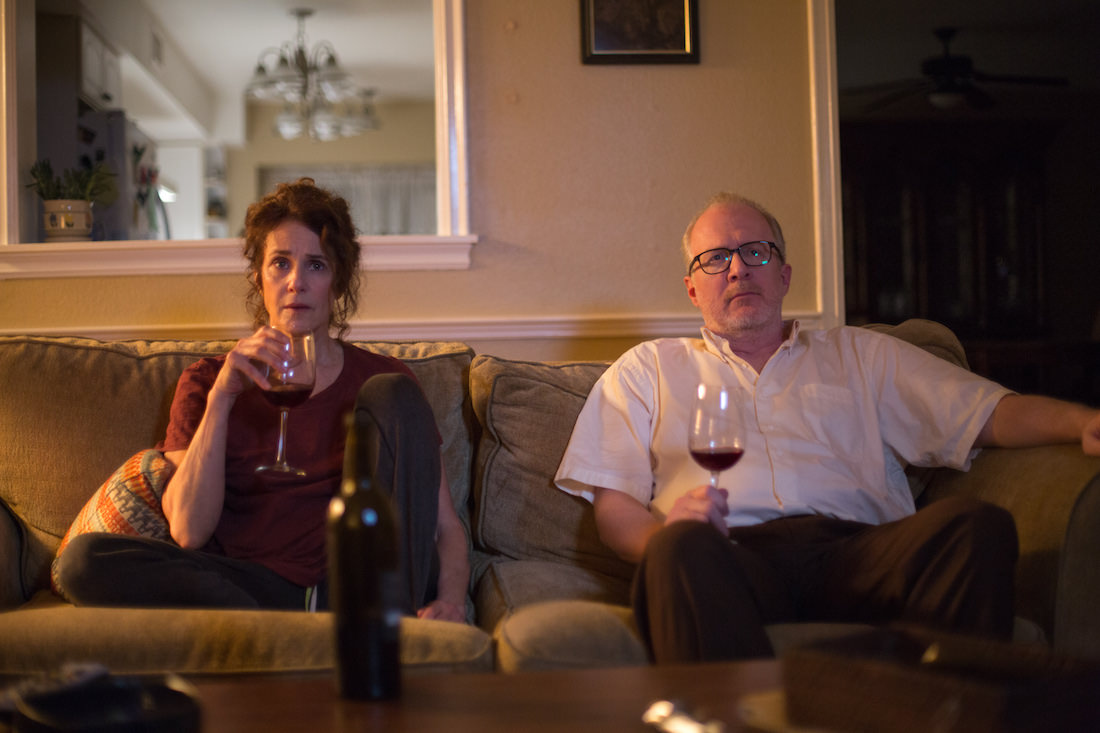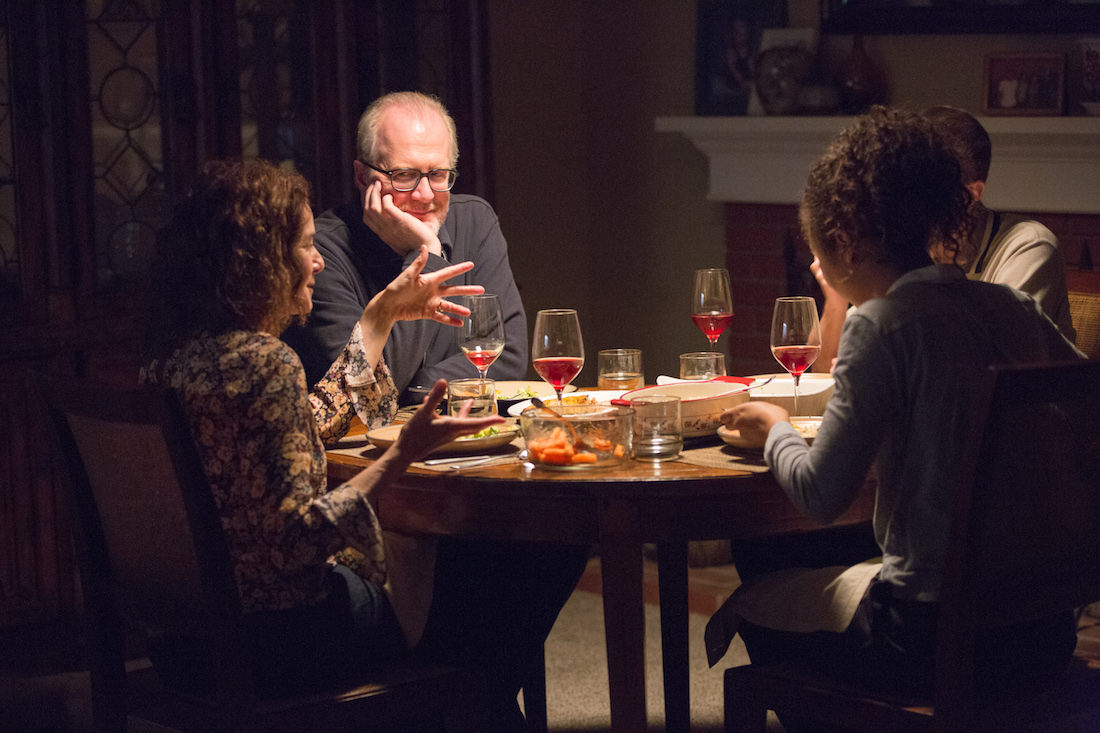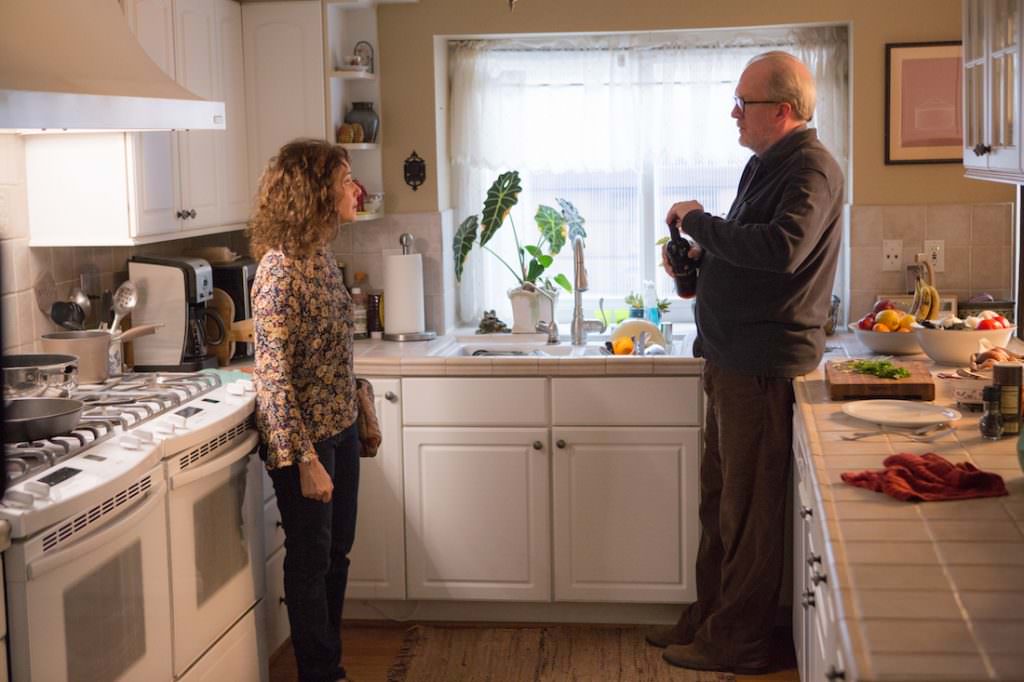Actor Tracy Letts & Writer/Director Azazel Jacobs Talk The Lovers
Writer-director Azazel Jacobs' rueful new drama began with Debra Winger's interest in its 2011 predecessor, Terri. The actress told Jacobs she liked that movie, so he consulted with her as he wrote what eventually emerged as The Lovers. In it, Winger and actor-playwright Tracy Letts are Mary and Michael, a suburban couple whose marriage has gone dormant. Each is dallying with another — Richard (Aiden Gillen) and Lucy (Melora Walters), respectively — yet is not quite ready to part. The union appears doomed, but as Michael and Mary prepare for a visit from their grown son, something unexpected happens: They become interested in each other again.
On a recent visit to Washington, Jacobs and Letts talked with The Credits about their collaboration, Letts' usual parts, the role of the writer and the movie's use of Labi Siffre's 1971 song, "It Must Be Love," which was a hit for Madness a decade later. The conversation, which has been edited for length and clarity, began with the director's explanation of Winger's influence on the movie.
Jacobs: It's great when you see work by actors that inspires you, but more than that, it's like, is there someplace we can both push each other to a place hopefully we haven't been to before?
Tracy, how did you enter?
Letts: I was delighted by the script, and the opportunity to work with Debra. I had a great conversation with Aza on the phone. His seriousness of purpose impressed me. And I don't often get asked to do things like this.
I've read your characterization of the sort of roles you're usually offered.
Letts: Yeah. Assholes in suits. I've played a lot of those.
So this was….
Letts: Not that. Somebody with more complexity, and a little more humor. I don't know what it is: the sound of my voice, my size, my age, whatever. I've been asked to play intimidating characters. Here I get to play a guy who's actually closer to me. I'm just a schlub getting coffee, like everybody else. I really related to the everyman quality of it.
Jacobs: That was the description of the character, right? Schlub getting coffee. [Letts laughs]
Was the germ of the script to depict romance among older people?
Jacobs: That wasn't the beginning of the idea, other than I did write with Winger in mind, so that dictated a certain age group. But I've never felt particularly young. That's not a thing I think about — to tell a young person's story. I remember being five, and missing being four.
That could be the premise of a movie.
Jacobs: Yes! [both chuckle]
But you could have written a May-September romance for Winger.
Jacobs: That's true. But I wrote with Debra with the idea that the right path would come later. She defined the kind of acting I was looking for. After that, it would all work out the way that I think it did.
Tracy, you won a Tony in 2013 for Who's Afraid of Virginia Woolf? This might be seen as the opposite of that.
Letts: Opposite? I don't know. They're both depicting marriages in some kind of trouble. The tones of the pieces are very different, and I think the character of the marriages is very different. Who's Afraid of Virginia Woolf? does concern a couple that's found a way to live with some lies. They've created a fiction in which to survive in their marriage. And I think that's true of this marriage as well. They've constructed a story. The walls of that have to come down a bit. In both pieces. So I guess there are some similarities.


Debra Winger and Tracy Letts. Credit: Photo by Robb Rosenfeld, courtesy of A24
Did you and Winger work out a backstory that's not on screen?
Letts: We did some talking about that, but I don't think we got too specific. If Debra has a richer and more detailed history for her character, she didn't tell me about it. But we talked about how we might have gotten to this point in our marriage. It's not even so much about the other partners as much it is that we've simply stopped talking.
It's interesting that both of the couple's lovers are sort of troublesome. They don't represent an ideal of romance outside of marriage.
Jacobs: I like that the movie begins where a lot of romantic movies would end. The things that we escape to can sometimes become heavier than we're escaping. This is about a couple who are connecting again, and in their affairs they're just being exhausted. I also understood how exhausting it is for the lovers. Robert and Lucy are both creative people who can't create. They're having trouble functioning. They need something more consistent in the way that ultimately pushes Mary and Michael back together.
When did you decide on having the son enter as a sort of catalyst?
Jacobs: That showed up really early in the script. I realized that they had a son, so there was a real consequence to their actions. One of the things that I liked about the story was that they were both equally guilty. And I liked the excitement of them rediscovering each other. I felt like there has to be a real weight that ultimately returns to the story. That's how I saw the son.
And I understood the son. In lot of ways, I probably first connected to the son. At a certain age, you realize that to function on this world, there are certain things that you're not supposed to say. And how infuriating that was as a kid, when I first realized it. So much of the day is performance.


Debra Winger, Tracy Letts, Tyler Ross and Jessica SulaCredit: Photo by Robb Rosenfeld, courtesy of A24
Tracy, you're a writer as well as an actor. Does that lead you to second-guess scripts?
Letts: No, I don't really engage with the script like that. If I read a script and I don't think it's any good, I won't do it. The first hurdle is whether I think the script is well written. Then when I'm in the piece, I hope I approach it just as an actor. It's not a writer-brain at work for me. I just ask the, in this case, writer-director, "Is this the best way to tell this story?"
The script was very solid when we started work. I don't think there's an improvised line in the movie. It's the movie we set out to make.
I remember when I was doing Homeland, the writers admitted to me, a few episodes in, "We were a little scared working with you. That you might start making notes and suggestions." I don't do that. I wear the two hats, but I very rarely wear them at the same time.
Is there a certain clarity in working with a writer-director rather than when there's a third party who wrote the script?
Letts: Only because the hierarchy of the theater is very different from the hierarchy on a film set. In the theater, the playwright is the boss. The final arbiter, anyway. On a film set, the director is the boss. And the writer comes way down below. If you're working with a director who hasn't written the script, and he's changing lines, I always feel a kind of guilt about that. "Wait a minute, what are we doing? We're changing it? Has the writer been consulted on this?" [chuckles] When it's a writer-director, you don't have to worry about that.
You eventually let us know that the central couple had been in band together when they were younger. What was the purpose of having a musical backstory?
Jacobs: I felt the music doesn't just connect this film to much older romantic films, but also reminds you what romance first feels like. That's the thrill of it, whether it's with the husband or the person on the side. It's a contrast to how you could be feeling later.
You have "It Must Be Love" in a central place in the film, but you didn't fill the soundtrack with pop songs, as is common in contemporary movies.
Jacobs: I would never do that. The Madness song is the kind of music I listened to when I was young, and I'm still listening to. These characters had to express something, and how would they express it? They haven't had their own words for a long time, but these are somebody else's words. I think that's what we do with popular songs. "That person is singing that thing that I've had a hard time saying, or I couldn't figure out any other way." Like the mix tapes that we used to make to profess our feelings.
Tracy, you're at the center of a climactic scene, singing the song. Is that more nerve-wracking than delivering lines, or is it the same thing?
Letts: The way for me to work on it is that it's another part of the acting. If I stand outside of myself, watching myself do it, I'll get too self-conscious. For me, it was about serving the story. And this character's backstory, that he used to be a person who was interested in music.
I sing as good as I sing. It's not as if my character needed to be a great singer. So it's like, I can carry a tune. I can get my way through this.
Jacobs: That's exactly what he said to me, too. "I can carry a tune." [Letts laughs.] But it was the emotion, really. That's the thing I knew he could do. Carrying a tune was a bonus.
This movie is set in Santa Clarita, which is in L.A. County but far from the areas we see often on movies. Was that for practical reasons, or metaphorical ones?
Jacobs: It was practical in the sense that we were working on a smaller budget. I wanted to work with the same crew, a lot of whom are based in Los Angeles.
But it's a part of Los Angeles that I had never been to. New York City is where I grew up; Los Angeles is where I've been living for a long time, but there's just a section of it that I know well. This about 30 miles outside the center of Los Angeles. For me, it was a totally new world. What I was looking for was to understand how Mary and Michael could make this choice. And this area is a place that makes sense to me. When it's time to get serious, when there's a kid, when you want a good school and a safe street, that's what I was looking for. I don't want it be some sort of judgment on how they got there. I wanted to fully understand. They have jobs. They may not be the best jobs, but they're jobs. They made all the right choices. They just wound up in this situation.
You've mentioned one influence on this movie that's surprising: early Ingmar Bergman.
Jacobs: Yes, but I think I have the title wrong. I'm one of the people who got Hulu for the Criterion Collection, and now I'm on Filmstruck for the Criterion. I knew the later stages of Bergman's work, but then I wound up seeing something early. I just stumbled upon it. Is it Dreamland? Is that possible?
Letts: [scrolling his phone] Here it is: Dreams. I don't know this movie. 1955. Same year as Smiles of a Summer Night, which certainly eclipsed it in the American filmography.
Jacobs: It's wonderful. There's a theatrical movement to the camera that made me think, "I want to do that." I want to represent the way that we are theatrical in our own lives. These are people playing characters of themselves. Or they're not themselves. Robert is not who he wants to be. Lucy is not.
It was a way for me to make peace with the lie of making movies. Where you feel that is just happening on screen, when in fact it's all choreographed. And at the same time to find real life that I found in that particular film.
A lot of time, for me, I go back to these earlier films and just think, "They are so far ahead of anything that's going on right now." It's something to aim for.
Featured image: Debra Winger and Tracy Letts. Credit: Photo by Robb Rosenfeld, courtesy of A24




